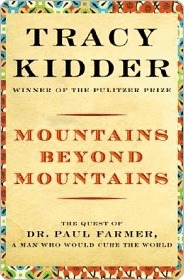More on this book
Community
Kindle Notes & Highlights
by
Tracy Kidder
Read between
October 5, 2021 - July 12, 2022
But most of the Haitian professionals on the staff—the doctor, the nurses, the technicians—offered explanations that laid the blame in the minds of the patients, the kinds of explanations one often reads in scholarly journals.
The annals of international health contain many stories of adequately financed projects that failed because “noncompliant” patients didn’t take all their medicines. Farmer said, “The only noncompliant people are physicians. If the patient doesn’t get better, it’s your own fault. Fix it.”
“But WL’s think all the world’s problems can be fixed without any cost to themselves. We don’t believe that. There’s a lot to be said for sacrifice, remorse, even pity. It’s what separates us from roaches.”
We walked on. I noticed, as I had around Cange, that many people we passed wore clothes from America, brand-name running shoes that had seen much better days and baseball caps and T-shirts bearing the logos of professional sports teams and country clubs.
“Sure,” I said. “But some people would ask, ‘How can you expect others to replicate what you’re doing here?’ What would be your answer to that?” He turned back and, smiling sweetly, said, “Fuck you.”
Education wasn’t what he wanted to perform on the world, me included. He was after transformation.
He allowed that growing up as he did also probably relieved him of a homing instinct. “I never had a sense of a hometown. It was, ‘This is my campground.’ Then I got to the bottom of the barrel, and it was ‘Oh, this is my hometown.’ ” He meant Cange.
Farmer returned home less and less during his last years at Duke, but it wasn’t as though he still intended, if he ever had, to trade in his old life for something fancier. “He had to get out from under his father,” Ginny explained. “Back home everything would revert to the old order.”
When P.J. had learned he’d been accepted at Harvard Medical School, he’d called home from Haiti to tell his parents, and the Warden had said, “Oh yeah, we knew you’d get in.” It had been, at moments anyway, a difficult relationship.
Virchow would write, “My politics were those of prophylaxis, my opponents preferred those of palliation.”
“The physicians are the natural attorneys of the poor, and the social problems should largely be solved by them.”
But he wasn’t mainly impelled by politics or religion, he’d say. He felt more curious about the world than outraged. He had the sense that the truth about events in places like El Salvador lay hidden from most Americans.
By now he had certainly progressed, as he would put it, from curiosity to indignation. But curiosity remained.
These circumstances all had causes, and the nearest ones were the continuing misrule of the Duvaliers and the long-standing American habit of lavishing aid on dictators such as Baby Doc, who used the money to keep himself and the Haitian elite in luxury and power and spent almost nothing on things like roads and transportation.
He’d come here to do ethnography, the kind of anthropology he most admired—learning about a culture, not through books and artifacts but from the people who had inherited and were making culture. His special field was going to be medical ethnography. He wanted to learn everything about morbidity and mortality in the most disease-ridden country in the hemisphere. He’d write about what he discovered and in this way, he told her, “lend a voice to the voiceless.” He’d also be a doctor. He wasn’t sure which branch of medicine he’d choose. Maybe psychiatry. In any case, he’d be a doctor to poor
...more
Aristide said, as Farmer remembered his words, “People read the Gospel as if it pertained to another place and time, but the struggles described there are in the here and now. The oppression of the poor, the abuse of the vulnerable, and the redemption that comes with fighting for what is right—what ideas could be more relevant in our dear Haiti?”
Perhaps it is a universal tendency to view the deaths of strangers philosophically.


